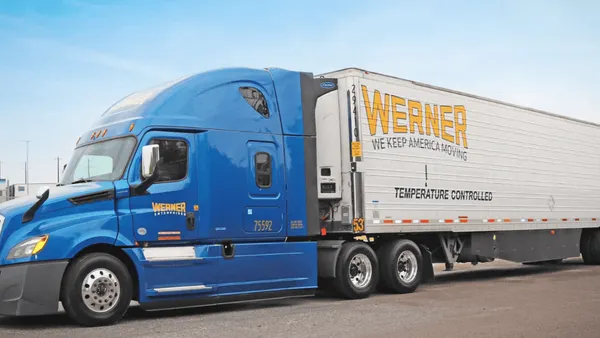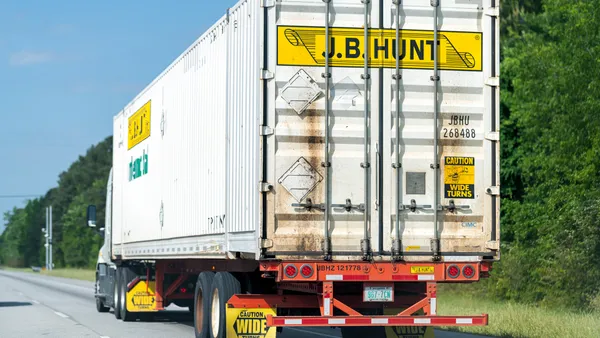Dive Brief:
- The International Longshoremen’s Association port strike last week across East Coast and Gulf Coast ports didn’t move trucking freight pricing significantly, but it’s leaving lingering effects on the logistics industry, analysts said in updates.
- Spot rates were largely unmoved by the three-day work stoppage that ended Thursday night, load board operator DAT Freight & Analytics reported during an Oct. 8 weekly market update. Principal Analyst Dean Croke said in the update that the strike didn’t make much of an impact on the freight market.
- “While the strike has been called off after three days, we expect that it will take 3-4 weeks to clean up and get vessels back on their rotation schedules,” DHL Global Forwarding said Tuesday.
Dive Insight:
Freight broker C.H. Robinson Worldwide noted truckload capacity remains robust, even across impacted areas.
That comes as trucking firms have continued to cling to more promising conditions, such as some upticks in new contract rates, to carry them out of a soft market that’s dragged on for the past two years.
But the disruption did affect container dwell times and rail congestion, C.H. Robinson noted.
“Impacts on contingency modes and routes, including U.S. West Coast ports, Canada gateway, non-ILA ports, and transload services are expected to continue as diverted freight continues to move,” the firm said Friday.
While meaningful strike-related price changes were lacking, the effects of Hurricane Helene caused notable jumps in local spot rates, analysts said. Additionally, linehaul rates have started to make a move upwards with a “definite inflection in the market” in the last few weeks that’s been sustained, Croke said.
The minimal impact of the short strike was overshadowed by Hurricane Helene as well as the anticipated effects of Hurricane Milton, Brent Hutto, chief relationship officer at Truckstop, said in an interview.
"People always try to get ahead of the problem," he said, noting the anticipation of the potential strike.
Adam Parish, director of trucking business operations at Flexport, found similar takeaways. “The three-day ILA work stoppage didn’t have a material impact on the FTL spot market; however, we are seeing a spike in spot rates as the market braces for the impending Hurricane Milton,” he said in an emailed statement.
Because intermodal freight only represents less than 10% of the freight in America, there was much less of a danger than if an entire industry stopped working, Hutto added.
But the threat of another strike still remains, the Trucking Association of New York noted.
“While the strike lasted only three days, it is important to recognize that the current agreement is tentative,” TANY President Kendra Hems said in a statement. “Negotiations on key issues must continue in order to reach a final agreement by the next deadline of January 15, 2025.”













